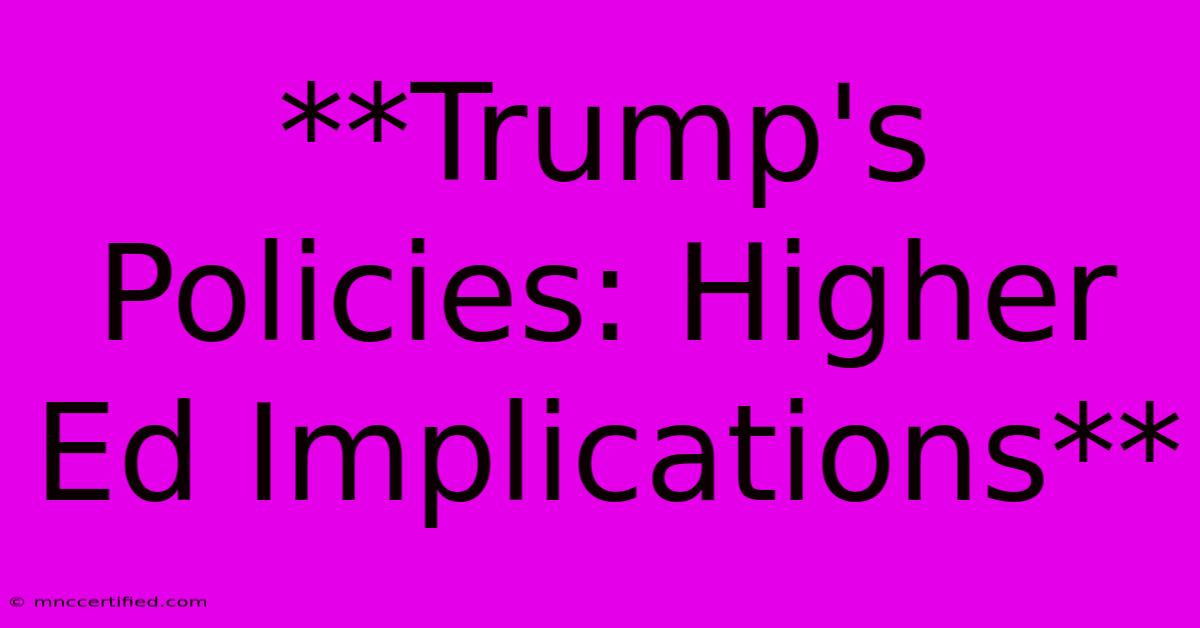**Trump's Policies: Higher Ed Implications**

Table of Contents
Trump's Policies: Higher Ed Implications
The Trump administration's policies had a significant impact on higher education, leaving a lasting legacy on institutions, students, and the future of learning. While the impacts were multifaceted, some of the most notable areas of change include:
1. Financial Aid and Affordability
Changes to the Free Application for Federal Student Aid (FAFSA): The administration made changes to the FAFSA application process, simplifying some aspects but also introducing new requirements for undocumented students. This impacted access to federal financial aid, particularly for students from marginalized communities.
Changes to the Pell Grant program: The administration's budget proposals initially sought to reduce the Pell Grant program, but ultimately it remained largely untouched. However, the freeze on funding increases and the focus on career and technical education resulted in limited growth for the program.
Impact on Student Debt: The administration did not implement any significant changes to student loan programs, though there were attempts to streamline the repayment process and address concerns about predatory lending practices.
Overall: While the administration did not significantly alter the overall funding structure of federal student aid programs, the changes implemented impacted access and affordability for certain groups of students, particularly those from low-income families or undocumented backgrounds.
2. Immigration and International Students
Immigration Policies: The administration's restrictive immigration policies, including the travel ban and restrictions on asylum seekers, had a chilling effect on international student recruitment and enrollment.
DACA: The Deferred Action for Childhood Arrivals (DACA) program faced significant challenges during this administration, with attempts to end the program and legal battles surrounding its future. This uncertainty created a climate of fear and instability for DACA recipients, impacting their ability to pursue higher education.
Impact on Diversity: The administration's immigration policies directly affected the diversity of higher education institutions, leading to a decline in international enrollment and creating concerns about the future of diverse learning environments.
Overall: The administration's focus on immigration control significantly impacted the international student population, leading to uncertainty, anxiety, and a decline in enrollment. This impacted the diversity of higher education institutions and the global exchange of knowledge.
3. Higher Education Regulations and Accountability
Changes to the Department of Education: The administration appointed Betsy DeVos as Secretary of Education, a controversial choice due to her lack of experience in public education. DeVos pursued policies that prioritized school choice and deregulation, leading to significant changes in federal oversight of higher education institutions.
Relaxed Regulations: The administration rolled back a number of Obama-era regulations, including those related to campus sexual assault, accessibility, and gainful employment. This deregulation was seen by some as a shift away from student protections and accountability for institutions.
Focus on Free Market Principles: The administration promoted free market principles in higher education, advocating for greater competition and deregulation. This approach led to concerns about the potential for predatory practices and reduced accountability for institutions.
Overall: The Trump administration's approach to higher education regulation focused on deregulation and privatization, shifting the focus away from federal oversight and student protection. This approach was met with mixed reactions, with supporters emphasizing the need for greater autonomy and critics highlighting potential risks to student rights and access.
4. The Future of Higher Education under Trump's Legacy
The Trump administration's impact on higher education remains a topic of debate. Critics argue that the administration's policies exacerbated existing inequities and weakened student protections. Supporters argue that the focus on deregulation and school choice led to greater innovation and opportunity.
Regardless of perspective, it's clear that the Trump administration's legacy in higher education is complex and will continue to shape the future of learning for years to come. Understanding the impact of these policies is crucial for policymakers, institutions, and students as they navigate the changing landscape of higher education.
For further exploration:
- Research: Explore the findings of academic studies examining the impacts of Trump-era policies on different aspects of higher education.
- News Sources: Consult reputable news sources to understand the ongoing debate and analysis of these policies.
- Policy Documents: Review the official policy documents released by the Trump administration to understand the details and rationale behind these changes.
This article provides a starting point for understanding the impact of Trump-era policies on higher education. By engaging in critical analysis and ongoing research, we can better understand the challenges and opportunities facing the future of learning.

Thank you for visiting our website wich cover about **Trump's Policies: Higher Ed Implications**. We hope the information provided has been useful to you. Feel free to contact us if you have any questions or need further assistance. See you next time and dont miss to bookmark.
Featured Posts
-
How To Cancel Farm Bureau Insurance
Nov 13, 2024
-
Skai Jackson Expecting First Child Disney Stars News
Nov 13, 2024
-
Black Owned Car Insurance Companies
Nov 13, 2024
-
Hotel Intruder Incident Leaves Mum Feeling Unsafe
Nov 13, 2024
-
Turpen Insurance In Plainview Texas
Nov 13, 2024